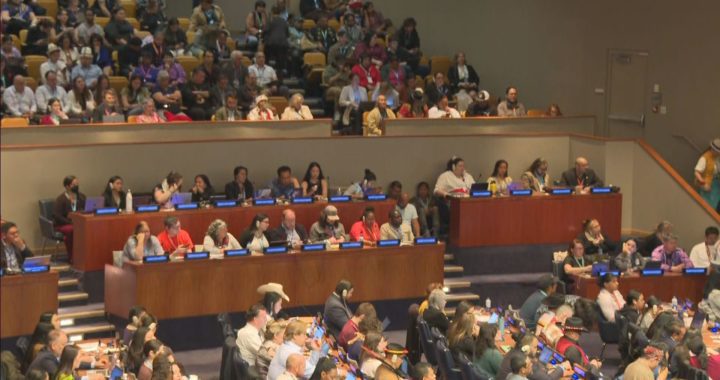Several First Nations leaders are calling on Manitoba’s Progressive Conservative government to either overhaul its approach to First Nations issues or resign.
Grand Chief Garrison Settee of Manitoba Keewatinowi Okimakanak, which represents 26 northern First Nations, stood alongside others on the steps of the legislature in Winnipeg Monday as fallout continued from Premier Brian Pallister’s remarks about Canadian history.
“Today, we are not here to topple any statues. We are here to topple a government that is racist, a government that has no place in this legislature,” Settee said.
Grand Chief Arlen Dumas of the Assembly of Manitoba Chiefs said he is tired of dealing with Pallister.
“I give him every opportunity to have meaningful dialogue. We bring forward meaningful solutions … but he’d rather talk at me,” Dumas said.
Pallister has faced growing discontent over remarks he made earlier this month after protesters tore down two statues of Queen Elizabeth and Queen Victoria on the legislature grounds.
Pallister said destruction is not the way forward. He said people who came to Canada did not come to destroy anything but rather to build communities, churches and businesses.
The remarks were widely condemned as downplaying the harmful effects of colonialism, although Pallister said afterward he never used the word colonialism and was trying to appeal for people to work together.
Pallister’s Indigenous relations minister quit her cabinet post two days later and her replacement, Alan Lagimodiere, stirred up more anger by defending the intent behind residential schools.
“The residential school system was designed to take Indigenous children and give them the skills and abilities they would need to fit into society as it moved forward,” he said.
Those comments were quickly denounced by Manitoba NDP leader Wab Kinew.
“I am an honorary witness for the truth and reconciliation commission, I listened to the stories of the survivors, and I cannot accept you saying what you just said about residential schools,” Kinew said. “It was the expressed intent of residential schools to kill the Indian in the child. It is not cultural relativism, it is not revisionist history, for us to say that was wrong.”
Read More:
Former Manitoba Indigenous relations minister criticizes premier after stepping down from post
That prompted two Indigenous men to resign from provincial economic development boards. One, former deputy minister and treaty commissioner Jamie Wilson, said he could not support the government rewriting history.
Some of Pallister’s caucus members have also made their thoughts known. Conservation and Climate Minister Sarah Guillemard, Families Minister Rochelle Squires and Tory backbencher Shannon Martin posted separate social media messages last week that said residential schools were designed to eliminate Indigenous culture.
“I will never stand behind words that add hurt to traumatized people,” Guillemard posted on Twitter.
Grand Chief Jerry Daniels of the Southern Chiefs Organization, which represents 34 First Nations communities, said Monday the Pallister government has failed to address key issues such as lower graduation rates, shorter lifespans, high rates of apprehension in the child welfare system, and a lack of recognition of treaty rights.
Daniels said the government must allow First Nations people more control over their own lives.
“If Pallister can’t lead, and his cabinet can’t lead, they do need to resign,” he said.
Chiefs of Treaty 5, an area that covers much of northern and central Manitoba, released an “action plan” Monday that promises greater efforts to tackle racism and discrimination. Part of the plan will see regular reports sent to the United Nations on the issue, and new awareness campaigns.
The provincial government did not comment on the grand chiefs’ demands, but did promise to consider the ideas put forward by the Treaty 5 chiefs.
“We look forward to reviewing the action plan and working collaboratively with Indigenous leaders and communities across the province,” read a one-sentence written statement from Lagimodiere’s office.
—With files from APTN’s Darrell Stranger









